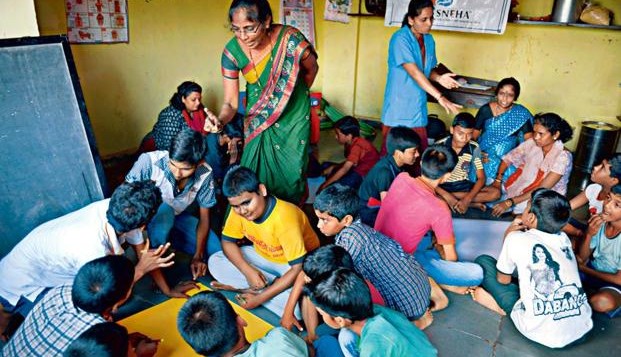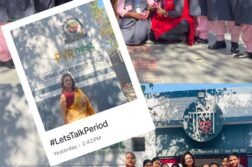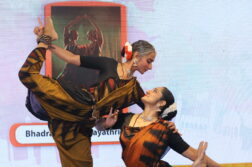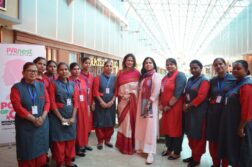
Source : Live Mint
Inside a dimly-lit community centre in Ghatkopar, Mumbai, a group of young boys are swapping notes on, among other things, what makes a man. Many of them aren’t even old enough to shave. Their voices, though, ring loud with conviction.
“A man takes decisions at home as he is the head of the family,” pipes up a 14-year-old. “Men work outside and earn, so they don’t work at home,” says his companion. As they get comfortable, the conversation turns towards girls.
“If a boy teases a girl and she does not respond, it shows that she is a good girl. If she retorts, she is acting smart,” says a Class VII student. Another boy joins in. “If after marriage, the husband lives at the wife’s place, she becomes powerful. And if the woman moves to the man’s place after marriage, he becomes powerful. He can beat her, insult her in front of others, use her.”
The boys, residents of Amrut Nagar, a slum colony of low-income migrants, are participating in a session on gender equality, part of a youth empowerment programme started by the Society for Nutrition, Education and Health Action (SNEHA) in 2009. Since early last year, the programme, “Adolescents Gaining Ground”, has also started reaching out to young boys. “The original avatar of the initiative, called ‘Girls Gaining Ground’, was started in these areas in 2009. Initially we focused solely on adolescent girls. Over time, we realized that to empower girls, we had to involve boys as well because they are future partners,” says Garima Deveshwar Bahl, programme director, sexual and reproductive health, SNEHA. “These girls were telling us about issues like eve-teasing and we were not talking to the boys at all.”
At around 243 million, India is home to the largest number of adolescents in the world, says Unicef’s Progress for Children: A Report Card On Adolescents, released in 2012. A group that, according to a 2008 study Youth in India: Situations and Needs Study by non-profit organization Population Council, makes up 30% of India’s population. The Unicef report highlights the critical need to invest in adolescents. In India, however, government programmes have usually targeted girls. Not enough, say experts, who add there is an urgent need for large-scale interventions among adolescent boys. They point to the recent incidents of rape that have generated huge outrage. In both cases, that of the assault on a young student in Delhi in December and the more recent one on a Mumbai journalist, some of the accused are between 16-24 years; coming from a milieu much like Amrut Nagar.
“In India, the whole focus of adolescent programmes has been on early marriage and early pregnancy, which targeted girls,” says Neha Madiwala, founder trustee of Sahyog Chetak, a non-governmental organization (NGO), which works for the empowerment of adolescent girls. “We haven’t found a good methodology to address boys. The usual approach to hold talks tends to work better with girls because they are looking for opportunities to get out of the house. Boys have more social freedom.”
SNEHA uses a mix of interventions, like group meetings, vocational training and life-skills education. Communicating these messages are facilitators drawn from the community. Although boys and girls are placed in separate groups, reaching out is a challenge.
“Parents never speak to girls or boys about puberty or sexuality,” says Sanjeevani Borude, 39, peer coordinator in Amrut Nagar. “One mother stopped sending her daughter when we held a session on puberty. We explained to the mother that her daughter has questions and she may get the answers the wrong way or from the wrong source. It is the same with boys. Parents don’t have a problem if their sons watch porn at a video parlour but when we explain it in the context of health, they get upset. It takes a while but eventually they listen.”
“Earlier I would never listen to anything my mother said,” says Rishikesh Shankar Karale, 15, who enrolled in the programme last year. He was reluctant at first because many of his friends would mock him. Now he regularly attends with his younger brother. “I have come to understand how hard my mother works at home. I help her now.”
An impact report, done six months after the intervention started, is showing encouraging results, especially when it comes to health matters like puberty and HIV; not so much when it comes to changing gender attitudes and perceptions. Clearly that will take longer. Over 70% of boys and girls agreed that both girls and boys are entitled to equal freedom; nearly a 20% improvement. When it comes to educating girls and sexual harassment, however, the improvement reported is not as significant. “What this shows is that we need to focus on gender very strongly,” says Bahl.
Pranita Acharya, gender, poverty and HIV/AIDS specialist, International Centre for Research on Women (ICRW), agrees. In 2008, ICRW, along with CORO (Committee of Resource Organizations) for Literacy and the Tata Institute of Social Sciences, initiated the Gender Equity Movement in Schools (GEMS) programme in Mumbai, which, specifically addresses gender-related issues. The initiative is in place in 45 municipal schools and reaches out to over 8,000 children between 12-14 years from low-income groups.
Through role playing, comic strips and interactive activities, students are encouraged to rethink social norms and question gender biases. Led by facilitators, children discuss what makes for healthy relationships. “Classroom discussions help students think about and question social norms. Facilitators encourage them to challenge stereotypical ideas about men and women,” says Acharya.
At the start of the GEMS programme in 2008, little over 20% of boys and girls supported gender equality. A year later, this grew to 53% of girls and 39% of the boys. There was greater support for girls pursuing higher education and marrying later and of boys helping in household work. The initiative is now being scaled up by the Maharashtra government.
“Evidence shows that reaching out to boys, even as early as of 8-10 years, is critical,” says Rema Nanda, founder, NGO Jagruti Trust, which conducts youth leadership programmes in rural Uttar Pradesh, Bihar and Rajasthan. “This is what we are seeing in different parts of the world. And you have to reiterate the message over and over again to get men to change their behaviour.”
The big picture, Nanda goes on to add, will not change unless violence against women ceases to be an individual problem. “In most of the successful interventions in South Africa and Latin America, men and women have agreed violence against women is a community’s problem. Unless that happens here, we cannot progress.”





